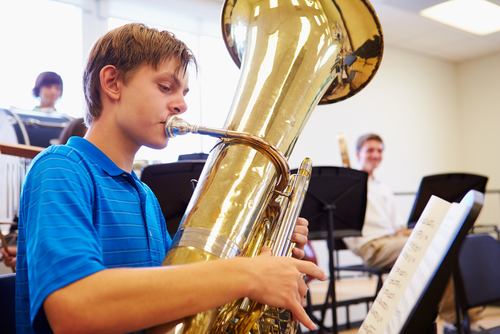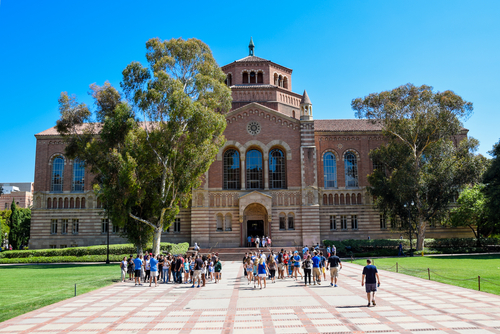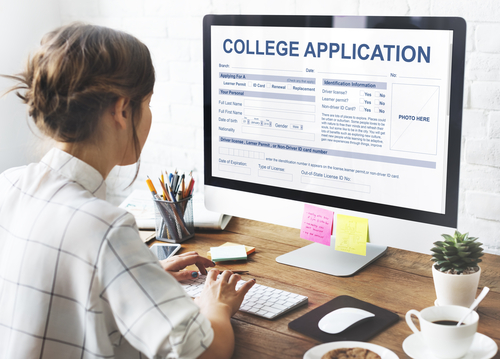For many years now, you probably have been hearing, “Where are you going to college? What do you plan on doing?” Although it may seem a bit overwhelming, taking small steps to prepare yourself ahead of time for college can really help. We have broken up each year with information so you can prepare each year and keep you on track to get into your best-fit college!
FRESHMAN YEAR

Even though college is 4 years away now is the time to start preparing for college. Keeping your GPA as high as possible, participating in extra curriculars activities, and planning your track can help with getting into the college of your choice.
Start Your GPA Off On the Right Track
Pretty much every class matters for your GPA. Even though some classes may seem like a “blow off” class or very easy, take the opportunity of getting an A in it. This will help keep your GPA strong. Your goal is to get as close to a 4 as possible.
Participate in Extra Curricular Activities

Your extracurricular activities and what you do in your free time in school or out of school will matter to college. Activities can differentiate you amongst other students that may be applying at the same time. Extra curricular activitie give college admission reps a glimpse into what interests you. Freshman year is a great time to try out new activities. Why not try writing for the school newspaper, check out the Spanish club or try your hand at the art club? Sports aren’t the only way to get college admission reps attention.
Get on the Right Track
Having a plan for what type of classes you will be taking will play an important role. Many times the first class you take will affect classes you take later on in high school. Usually, students that start out in honors classes, will stay in honors classes for the duration of high school. Colleges look for students who are taking challenging courses throughout their high school years. Colleges will give higher ‘weight’ to more challenging classes.
Take a Foreign Language

Taking a foreign is required for most colleges. Each school has a different requirement. Ivy league schools will require 4 years of a foreign language and very selective schools require 2 to 3. Plus by taking a foreign language often times school offer student trips or student exchanges which will also beef up your college application.
Start Thinking About ACT and SAT tests
Even though you don’t have to take your PSATs, SATs, ACTs, or subjects tests freshman year, the best thing you can do to prepare is read. Reading helps you tremendously on standardized tests. Studies have shown that when students read for fun they develop critical thinking, learn new subject matter and learn about other cultures. In addition, Reading leads to improved information retention, sharper comprehension and a larger vocabulary.
Start Building Your Network

Most colleges require a teacher recommendation. It’s a good idea to build a rapport with your teachers, especially in the subject area that you are most interested in. If possible meet with your guidance counselor so they get to know you. That could help if you have questions about course selection or how to to begin building your network.
Write Your Resume
Start now to write down any major accomplishments or awards that you get. By the time you are into your late junior or senior year, you may have forgotten. It also helps if you are looking for a part-time job in the summer months. Employers love students who are achievers!
Start Thinking About Best Fit Colleges

You don’t necessarily have to have even an idea of your future college major or your top schools by this point, but ou should though start thinking about what type of atmosphere you like. Do you like bigger classes or small, the bustling city or a small quieter campus? This will help you in late Sophomore and Junior year when researching colleges.
SOPHOMORE YEAR
Practice PSATs in the Fall
In the fall time, many juniors take the PSATs. As a sophomore, it’s a good idea because the more comfortable that you are with standardized tests, the better you’ll do. A lot of taking standardized tests is learning how to take the test and being relaxed. Plus you can start getting brochures from colleges if you opt to receive them. You’ll be able to read up on some of them before it’s time to make some big decisions.
PreACT
Just like the PSATs but for the ACT exam. This will help you get ready
From ACT
The PreACT test provides students with practice for the ACT test and measures of progress towards college readiness. Schoolwide adoption of the PreACT improves ACT test scores, interest-major fit, and college score-sending behavior.
Visit College Fairs

Many high schools, especially larger ones, will host college fairs. Many bring college representatives from all over the country. You can ask questions and make a first contact with the college. College admission counselors take into account, demonstrated interest. That basically means that (link)Demonstrated interest is the degree to which you show a college that you are sincerely interested in coming to their school
Pitch in and Volunteer

Volunteering shows college admission reps that you show have interest in other issues outside your world and give back to the community. It also shows to admission reps that you have good time management skills, that you can juggle all of these tasks all while getting good grades. If you can get a leadership position volunteering or doing community service, even better!
“In a survey of 264 admissions officers at U.S. colleges, 58% of admissions officers agreed that community service has a positive impact on a student’s acceptance to their college or university. Even more importantly, 53% said that community service was a tie-breaker between equally qualified students.” -Source Niche, 2019
Strive for Leadership Positions:
Speaking of leadership positions, schools like to recruit go-getters and leaders. You can lead the school’s Spanish club or maybe be a student leader for incoming freshman. Whatever it is they are always looking for future leaders. As a leader it says you have
Great communication and interpersonal skills
Stellar time management
You can collaborate in a group environment
You go the extra mile
SUMMER GOING INTO JUNIOR YEAR
READ!

Reading will help you with your standardized test. Whether it is ACT or SAT, read for pleasure. It will help you with critical thinking, learning new vocabulary, and learning about new topics and situations.
Get a job
Get a job to help for paying for college. Also, admission reps count having a job as an activity. Better yet, try for a leadership position at your job and you can add that to your list of accomplishments.
College visits

While you are enjoying the summer, pick a few colleges to go visit. You could even make little vacation out of it! Remember colleges love when you show an interest it their school. Make sure you set up an appointment to get on the college’s radar and also to get a great school tour.
JUNIOR YEAR
Meet with your Guidance Counselor
Check in with your guidance counselor and make sure that you have all the credits and requirements you need to graduate. Talking to your guidance counselor will help.
Study for the ACTs or SATs
Hopefully you have been doing a good amount of reading all along. As we said, this will help you throughout your exam. There are resources and companies to use when studying for your standardized exams. There are a couple of great ones that are free to use as well. Khan Academy has an entirely free course
Take any AP exams

If you have taken an AP class and or pass AP exams, you may get credit for those courses. This will help you be able to take other classes that are more interesting to you and possibly save you some money too. Not all colleges will accept your APs for college credit. Reach out to the colleges that you are most intersted in to see what they will accept.
Continue Building Relationships With Teachers
Start thinking of teachers you have a good relationship with who may be able to write your college recommendation. By the end of junior year, it’s not too early to ask. You certainly don’t want to wait until everyone asks. Many teachers have a cap of how many they will do.
Narrow Down Best-Fit Colleges

Think about and research what types of college you’d like to attend. Will you be happier in a big school or small, rural, or city. Those are important to think about as it will affect how you enjoy college.
Discuss Careers and Majors
Talk to people that are currently doing what you may like to do in the future. They can tell you what they majored in, how they got there, and what path they took.
Start Your Scholarship Search

Start looking for scholarships and what is out there. Make sure you check the deadlines and requirements. You may need recommendations and you want to make sure you save time for that. There are many companies online that will give you a list to apply to, some maybe easy and some may require a little more time and patience.
Plan College Visits and Tours
The middle of your junior year, you may have narrowed down a few schools that interest you. Reach out to the school and get an appointment to schedule a college tour.
SUMMER GOING INTO SENIOR YEAR
List Top Colleges
You probably narrowed down your top college choices by now. Make a list of which colleges you’d like to reach out to and find out any deadlines or requirements. Mark down all your deadlines and have a system for keeping track of your top choices.
Get on the Road and Take a Campus Tour
Visiting and doing a campus tour of the colleges most interested in going to is important now. Make sure when you visit you call ahead and make an appointment and make appointments with faculty, professors, and students .Tell them who you are so you can get on their radar and that you are showing a “demonstrated interest”. Prepare questions you’d like to have answered while you are there.
READ!
Keep Track of Deadlines

Add deadlines to your calendar for fall and winter. Some colleges have different deadlines, keep track of them–rolling, priority, early decision, and early action
Plan auditions or create portfolios to send to schools. Check with the college you are most interested and found out their requirements.
SENIOR YEAR
Take Standardized Tests

Whether it’s SAT, ACT, AP or subject tests find out when they are and prepare. As we said before keeping on reading. That will help you with your tests!
Get Letters of Recommendation
Most colleges require a letter of recommendation. They can usually come from a teacher, employer, or guidance counselors. Give them plenty of notice. Some teachers will get multiple requests and have a limit on how many they will do.
Keep up Your Grades and Extracurriculars
Colleges want to make sure that you keep your grades up and keep participating in your extracurriculars. Try hard not to give into “senioritis”!
Meet With Your Guidance Counselor
Check in to make sure that you know the process for sending transcripts and ask any questions you may have. They are a great resource!
Complete Applications

You should try to have at least one application completed by Thanksgiving. in fall and follow up in the winter. Prioritize your top school choice. Make sure you have it all completed before you submit your applications. Follow the instructions to a “t” so you are not disqualified for a little mistake.
Did you know If you cannot afford the application fees that many colleges charge, ask your counselor to help you request a fee waiver.
Find Scholarships
There are millions of dollars worth of scholarships out there. Some are even easy to get. Find out what kind of information they require and build a spreadsheet with what you have sent so you can follow up if need be. Don’t fall prey to those sites that charge to research scholarships. Researching and applying for scholarships never charge a fee.
Fill out your FAFSA!

To apply for federal student aid, such as federal grants, work-study, and loans, you need to complete the Free Application for Federal Student Aid (FAFSA). Just make sure you keep in mind important FAFSA dates and deadlines! There are often “FAFSA Day” programs at local high schools and community centers to help fill out the form.
October is the official start to filling out the FAFSA forms. Check with your highs school as many of them have FAFSA Days to help with filling out the form.
Notify schools of intent AKA Commitment Day!
If you are wait-listed by a college you really want to attend, visit, call, and write the admission office to make your interest clear. Ask how you can strengthen your application.
After


